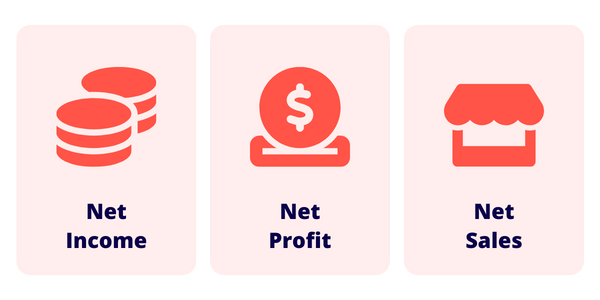From net income and net profit to net worth and net sales, the word ‘net’ shows up everywhere in business and finance – and parts of everyday life as well. But what does it really mean? And why is it such a powerful concept when it comes to managing your money and business?
It’s time to unpack the net meaning across different contexts so you can confidently use and understand the term in your day-to-day operations.
Net definition
At its most basic form, ‘net’ means the amount that’s left after all deductions have been made. In business and finance, that involves subtracting your expenses, taxes, and other costs from a total amount – whether you’re calculating earnings, income, sales, weight or something else entirely.
In other words, if ‘gross’ is the whole pie, then ‘net’ is the slice you actually get to eat.
It’s also worth remembering that ‘net’ functions as both a noun and an adjective. The net noun form is things like a soccer net or a fishing net (a string or rope mesh designed for catching). As an adjective, ‘net’ usually describes a final or clear profit, like net income or net result.
Whether you’re checking your net earnings or playing tennis, ‘net’ almost always points to what’s left, what’s caught, or what matters most.
Net in business and finance

Net income
This is your company’s total revenue minus all operating expenses, interest, taxes and other costs. Think of it as the ‘bottom line’ – the final score of your business performance in a given quarter or financial year.
As an example, if your business makes $500,000 in total income but spends $300,000 of that on salaries, rent and taxes, your net income would be $200,000.
Net profit
While it can be used interchangeably with net income, net profit more specifically describes what’s left after subtracting all expenses, including cost of goods sold (COGS), operating costs, interest and tax. It’s your clear profit.
Gross profit, in contrast, only subtracts COGS and doesn’t include other expenses. So net profit gives you a clearer picture of your company’s profitability.
Net sales
Net sales = Total sales revenue – Discounts, returns and allowances
This figure gives you a good sense of your actual sales outcomes, and it’s used in accounting reports to show whether a business is running at its highest efficiency.
Other financial uses of ‘net’
- Net amount: The value left after deductions (e.g. tax or discounts).
- Net worth: The value of a person’s or business’s assets minus their liabilities – a popular measure of financial health.
- Net cash flow: Cash inflows minus outflows during a specific period.
- Net margin: Also called net profit margin, it measures how much profit a company earns as a percentage of revenue.
Bottom line is that these metrics are all incredibly useful for budgeting, tax reporting, financial planning and understanding your business performance overall.
The history and evolution of ‘net’
The word history of ‘net’ is fascinating – no, we’re not joking! Its origins lie in Old English (net, nett) from Proto-Germanic natja, meaning something made of twine or mesh – a ‘device for catching’. It shares roots with German nett and Dutch net.
Over time, the word found its way into both the financial and digital worlds:
- In the internet era, ‘net’ is shorthand for ‘network’ – a system of interconnected computers and servers.
- In finance, it’s the remaining value after all deductions – a metaphorical ‘catching’ or ‘filtering’ of the real results.
So whether you’re weighing fruit and veggies or reading a balance sheet, ‘net’ still has the same underlying concept: what’s captured, or left over, that truly counts.
Common phrases using ‘net’
Here are some widely used terms where ‘net’ is the star of the show:
| Term | Definition |
|---|---|
| Net result | The final outcome after all factors are considered. |
| Net gain | A positive result after accounting for costs. |
| Net loss | A negative result after expenses exceed revenue. |
| Net worth | Assets minus liabilities. |
| Net income / net profit | Revenue minus all expenses and taxes. |
| Net sales | Total sales minus returns and discounts. |
| Net weight | Weight of a product minus packaging. |
| Net amount | Final value after deductions. |
| Net wide | Describes something as being across an entire network or region (e.g. company net-wide changes). |
The word net might seem simple on the surface, but it carries a whole lot of weight – both literally and figuratively. So next time you hear someone talk about their net worth, remember: it’s what’s left that counts.
See related Terms:
What is gross profit?
Gross profit vs net profit
What is net profit?



















































